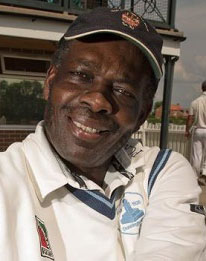LONDON, CMC – England and Wales Cricket Board chairman, Colin Graves, has waded into the controversy surrounding great former West Indies batsman Collis King’s deportation from Britain, offering to lend his assistance to ensure the “colossus” was able to return and continue his contribution to English cricket.
King, who starred in the 1979 World Cup final with an astonishing half-century, was forced to return home to his native Barbados four months ago after immigration officials denied his application for a spousal visa.
Though he had spent the last 44 years plying his trade here as a professional cricketer and coach, King was told he application needed to be submitted from Barbados instead of England. He was subsequently given two weeks to leave the country.
King, who has been in Barbados since awaiting word on his application in order to be reunited with his British wife, said he even had his passport confiscated on departing England, with the document only returned on landing in Barbados.
Graves told the Daily Telegraph newspaper here he was willing to lend his support to the 67-year-old in a personal capacity, in an attempt to have the former Windies star resume his career.
The ECB official has had a long-running friendship with King, having served as chairman of Dunnington Cricket Club in Yorkshire, where the veteran cricketer spent two decades as a pro. “I have known him for 25 years and he has played in and around Yorkshire, and the amount of coaching he has done with kids and schools has been fabulous,” Graves explained. “He has really promoted kids’ cricket and developed and coached players. It is not like he has just turned up, played and left. He has been part of the community wherever he has been.
“I know Dunnington did not have a junior section before he went to play for them. He started it up and now they have 70-80 kids and he is still coaching now. That is where he has been a big asset.
“He has never been a drain on anybody. He has never drawn benefits and he is so fit and active I doubt he has ever used the NHS.”
He continued: “I was staggered that his application was thrown out without any further investigation. Someone just looked at it and said, ‘On your bike’ and he was out. Nobody seemed to bother to look at it. It was cold and that is what upset me. They did not look at the individual, it was just another number on a file.
“From a cricket point of view in Yorkshire he has been a colossus. He is known around all the clubs and we will do everything we can from a cricket point of view because he is helping with what we are trying to achieve in the recreational game.”
King said he had sought the help of the British High Commission while in Barbados but no help was forthcoming.
The UK Home Office here said it did not comment on individual cases.
King played only nine Tests and 18 ODIs but came to prominence in the 1979 World Cup final with a scintillating 86 off 66 balls, in a 139-run, fifth wicket stand with Sir Vivian Richards (138 not out).
The partnership formed the basis of the Windies’ second successive World Cup triumph – a 92-run win over England – and wrote King’s name into global cricket folklore.
King went on to play league cricket as well as representing Counties like Glamorgan and Worcestershire. Up until recently when he decided to spent more time with his wife, he spent the summers in England and the remainder of the year in Barbados.
Describing King as a “cricket ambassador”, Graves said his contribution to the leagues had been invaluable.
“He is one of the most genuine blokes you could ever come across. He is very sociable. He can handle himself in all situations,” Graves asserted.
“He is very loyal, whoever he gets to know or team he plays for he is totally loyal to them. He is a cricket ambassador. You put him in a cricket community, he is like a honeypot. He attracts the bees.
“If you look at his record in league cricket it is phenomenal. The good he has created over the years with people playing with and against him has lifted the whole league.
“He is not a taker. He is someone who wants to put things back in. He turns up, spends time at the clubhouse, socialising with people. He would play midweek matches and Sunday matches. He was totally committed to whatever he was doing.”

